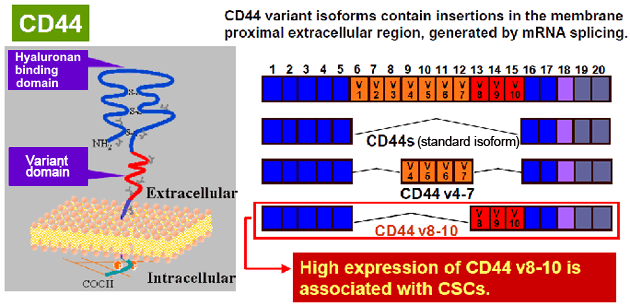CD44 splice variant antibodies
CD44 variant antibodies
Kit
Product Brochure
CD44 splice variant mabs
for cancer stem cell detection and enrichment. PDF Download
CD44 variant antibodies and kit for characterizing and isolating cancer stem cells

CD44v positive cancer stem cells are reported to be resistant to chemo and radiation therapy, in part due to elevated resistance to ROS and slow growth. Serial adoptive transfer studies have shown that these cells are highly enriched in tumorigenic potential. Thus, these cells are thought to survive therapeutic tumor mass reduction and upon epithelial mesenchymal transition seed distant metastases, ultimately leading to the lethality of both solid and hematopoietic cancers.
The transmembrane signaling protein CD44 binds through its extracellular domain to multiple extracellular matrix components including hyaluronan and fibronectin. It is encoded by 20 exons, 10 of which are variably included in the mature mRNA via alternative splicing controlled in part by the splicing factor ESRP1. These 10 exons contribute to variation in the membrane proximal extracellular domain of the protein. Certain variant isoforms have been shown to confer binding to growth factor receptors and importantly to a subunit of the cystine-glutamate antiporter responsible for replenishing intracellular GSH levels, thereby contributing to ROS resistance in some cancer stem cells.
Combinatorial splicing of the variant exons can theoretically yield 1024 different CD44 isoforms. Which of these potential isoforms are actually produced and physiologically relevant in different normal and tumorigenic contexts remains to be explored. Apart from the paucity of cancer stem cells in tumor explants and difficulty in their purification, the lack of a comprehensive set of validated variant isoform-specific antibodies has limited progress in understanding the role of CD44v in cancer stem cell biology.
Our rat anti-human CD44v9 monoclonal antibody recognizes CD44v8-10 and has been cited in numerous publications including the landmark paper mentioned above describing the association of CD44v8-10 with the cystine-glutamate transporter. It has been used in multiple applications, including immunoblot, IHC, IF, ELISA, flow cytometry, IP, MACS and photo-immunotherapy. In addition, we hope you will find useful our new RV3-conjugated magnetic bead kit for easy isolation of CD44V9 positive cancer stem cells. Finally, we carry a rat anti-mouse CD44v10-e16 that has been validated in flow cytometry and IHC.
| Type of cancer | CSC markers |
| Colon cancer | CD44+ CD133+ |
| Breast cancer | CD44+ CD24-/low |
| Gastric cancer | CD44+ |
| Pancreatic cancer | CD44+ CD24+ ESA+ |
| Hepatic cancer | CD133+ |
| Prostate cancer | CD44+ |
| Metastatic melanoma | CD20+ |
| Head and neck cancer | CD44+ |
| Brain tumor | CD133+ |
| Acute myeloid leukemia | CD34+ CD38- |
Example of isolating cancer stem cells using anti-human CD44v9 antibody
1. Human breast cancer cell line MDA-MB-231

2. Human pancreatic cancer cell line AsPC-1

3. Human prostate cancer cell line PC-3


Fig.2 Flow cytometry Cell Sorting of CD44 v expression level in Human cancer cell line with anti-CD44 v9 (RV3) antibody and PE-labeled anti Rat IgG antibody. Two kinds of subpopulations “CD44v+ (High) and CD44v- (Low)” were isolated

 |
 |
| Fig.3 Immunohistochemistry staining Breast Invasive Ductal Carcinoma with anti-CD44 v9 antibody (clone RV3, 0.2μg/mL) | Fig.4 Immunofluorescence staining of CD44 v (green) in MDA-MB-468 cells with anti-CD44 v9 antibody (RV3, 3μg/mL) |

Fig.4 Western blot analysis of CD44 v in BT20 cell lysate with anti-CD44 v9 antibody(RV3, 1μg/mL). CD44 knockdown samples (CD44 siRNA #1, #2) were not detected. NT: no treated NC: non-targeting siRNA treated sample

Application Examples
Citations
Ordering Information
| Name | Catalog Number | Host | Reactivity | Clone | Applications |
| Anti CD44 v10-e16 | CAC-LKG-M002 CAC-LKG-M002S |
RT | MS | RM1 | FC IHC |
| Anti CD44 v9 | CAC-LKG-M001 CAC-LKG-M003 |
RT | HU | RV3 | FC WB IHC(p) IF ELISA IP MACS Photo-immunotherapy |
| Magnetic Cell separation Kit for Human CD44v9+ Cancer Stem Cell | CSR-CSC-SEP1 | RT | HU | RV3 | Cancer stem cell isolation |

